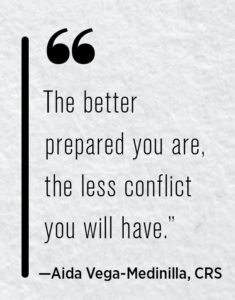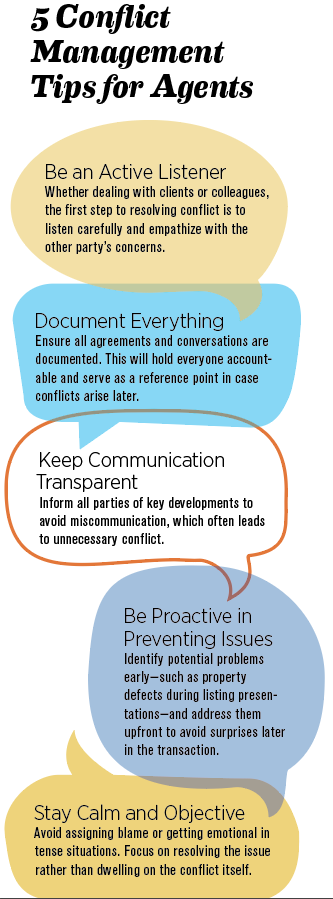Conflicts are unavoidable in the high-pressure world of real estate, but you can rise above them with the right approach
By Kim Vodvicka
Whether it’s a disagreement between a buyer and seller or a misunderstanding between agents, managing disputes effectively is critical to ensuring smooth transactions and maintaining professional relationships.
Aida Vega-Medinilla, Linda Hoverman O’Neal and Bernice Maez—each a CRS Designee—have seen their fair share of conflicts in their real estate careers. Here, they share their best strategies for turning these challenging situations into opportunities for growth and success.
 Preparing for conflict
Preparing for conflict
Since conflict can happen at any time during a transaction, real estate professionals must be prepared. According to Aida Vega-Medinilla, CRS, broker-owner at Horizon Real Estate in Miami, Florida, one key to handling conflicts successfully is being proactive and anticipating potential issues before they arise.
“The better prepared you are, the less conflict you will have,” Vega-Medinilla says. She recommends thoroughly understanding each client’s needs and concerns and setting clear expectations. She emphasizes that this helps avoid surprises and misunderstandings down the road.
Linda Hoverman O’Neal, CRS, associate broker at RE/MAX Executive in Tega Cay, South Carolina, says one of the most important things an agent can do is remember their role. “Your job is to facilitate the transaction and make sure that everything goes well from beginning to end,” she says. “You are not buying that house. You are not selling that house. Your job is to facilitate.”
A great team and training are also key to being prepared for conflict. Vega-Medinilla encourages her team to develop conflict management skills through continuous learning and training. “An excellent, trustworthy, and knowledgeable team makes all the difference, and you should train your team the best you can,” she says. “Training gives you more opportunity to solve issues before they arise. I could not do what I do without a great team.”
The role of listening and empathy
When it comes to conflict management, O’Neal emphasizes the importance of listening and empathy. When asked how she handles conflict between two parties, she replies: “Very calmly, very rationally. I try to put myself in both situations and simply address them with common sense and with a solution,” she explains.
According to O’Neal, understanding both the buyer’s and seller’s expectations is crucial, especially when it comes to common disputes over repairs, which she says is the most common type of conflict she encounters. “The seller is trying to hold onto every single dollar, and the buyer is trying to make sure they don’t have to pay any more dollars,” she says. Walking through properties with clients and identifying potential problems early helps her minimize misunderstandings before they escalate.
she says is the most common type of conflict she encounters. “The seller is trying to hold onto every single dollar, and the buyer is trying to make sure they don’t have to pay any more dollars,” she says. Walking through properties with clients and identifying potential problems early helps her minimize misunderstandings before they escalate.
Vega-Medinilla emphasizes the power of personal communication in resolving conflicts. “The human touch is something that always helps,” she says. “I believe one of the most important things is personally speaking with people. It doesn’t have to be in person, but it has to be a call.” By taking the time to speak directly with clients or colleagues, she believes that individuals feel heard and valued, which can make a significant difference in resolving disputes effectively.
Maintaining professionalism and the art of negotiation
Disputes between agents can occasionally arise, but Bernice Maez, CRS, sales agent at Vivo Realty in Plano, Texas, believes the key to resolving these issues lies in respectful communication. As an agent dealing with buyers and sellers, Maez advises, “You don’t want to pick sides. Staying in the neutral zone can keep it respectful.” She adds that resolving the issue without assigning blame diffuses tension and ensures that both parties feel heard and respected.
 All three agents agree that word choice—what Maez refers to as “wordsmithing”—is essential during conflict resolution. “It all stems from your delivery,” Maez says. In her view, accusatory tones or finger-pointing can quickly derail conversations, so it’s crucial to stay calm and constructive when discussing sensitive topics like commission splits or repair requests. “Asking for a credit or a repair in one way versus another is going to make a huge difference. I’ve seen that with buyers and sellers, as well as with other agents. Choosing your words very carefully before you speak—that’s been my biggest savior.”
All three agents agree that word choice—what Maez refers to as “wordsmithing”—is essential during conflict resolution. “It all stems from your delivery,” Maez says. In her view, accusatory tones or finger-pointing can quickly derail conversations, so it’s crucial to stay calm and constructive when discussing sensitive topics like commission splits or repair requests. “Asking for a credit or a repair in one way versus another is going to make a huge difference. I’ve seen that with buyers and sellers, as well as with other agents. Choosing your words very carefully before you speak—that’s been my biggest savior.”
Similarly, Vega-Medinilla stresses the importance of transparency and keeping an open mind. “It’s fantastic if you get everything you want, but the reality in life is that everything is a negotiation.” By clearly communicating expectations and keeping clients informed throughout the process, real estate professionals can help reduce anxiety and build trust.
Turning conflict into opportunity
Conflict is inevitable in real estate, but how agents handle these disputes sets them apart. By listening, empathizing and maintaining clear communication, professionals like Vega-Medinilla, O’Neal, and Maez turn conflict into an opportunity to build stronger relationships and close more deals.
“I consider it a good outcome when everybody feels that they have won something,” says Vega-Medinilla, a statement with which O’Neal and Maez agree.
O’Neal says delivering difficult news is sometimes unavoidable, but the key is to have solutions ready. “Before you deliver difficult news,” such as a buyer terminating a contract, she says, “it’s your job as the agent to see if you have a solution that you can deliver along with that news.”
At the same time, agents must pick their battles. “I often tell our REALTORS® that sometimes you have to walk away,” Maez says. “It’s not a bad thing. Sometimes that’s better than dealing with the stress.”
As these experienced CRS Designees demonstrate, preparation, patience and professionalism are the keys to managing conflict successfully in the competitive real estate industry. By staying calm, professional and proactive, real estate professionals can resolve conflicts effectively and turn them into opportunities for growth and success. With the right approach, even the most challenging situations can lead to positive outcomes.








